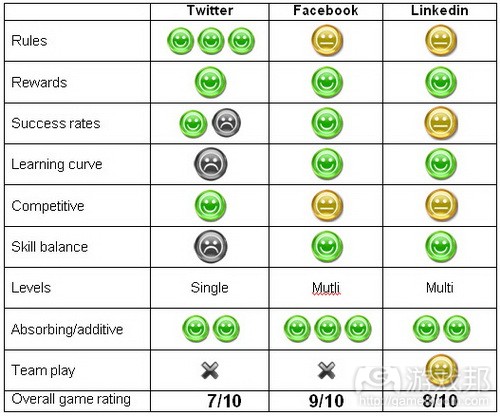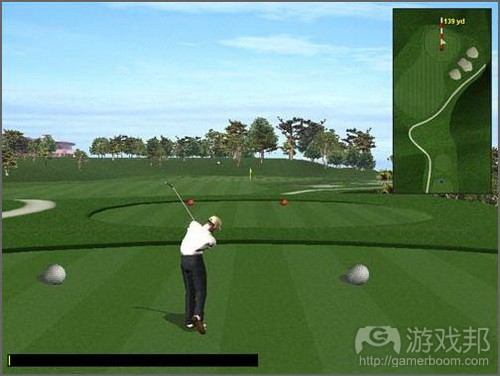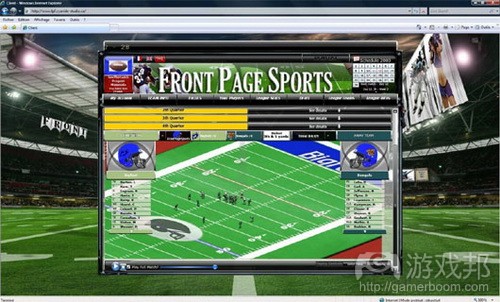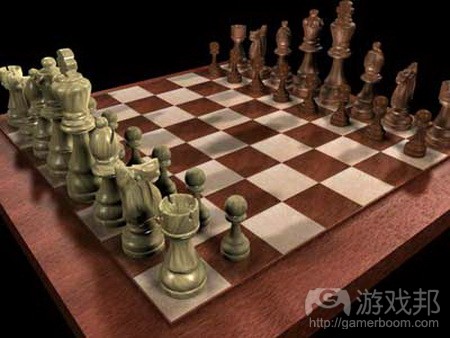分析3大社交平台的游戏机制
作者:Jon Puleston
过去一段时间,我深入研究游戏理论,旨在探究如何有效将调查工作游戏化,我发现如今游戏机制开始嵌入各种活动之中。
出于好玩,我从游戏角度分析和比较植入Twitter、Facebook和LinkedIn的游戏机制,探讨究竟哪个平台才是最佳游戏。
以下是成功游戏的基本机制:
1. 严格规则
2. 能够带来乐趣和情感满足的奖励机制
3. 均衡成功/失败机率(游戏邦注:融入能够驾驭的挑战)
4. 长久学习过程
5. 各种竞争元素
6. 平衡运气和技能元素
7. 关卡
8. 成瘾元素(本身是否是个有趣活动)
9. 团队玩法
看看它们的得分情况。
社交网络的规则评估
1. 规则:成功作品通常设有严格而荒谬的规则,将任务变成有趣体验。以高尔夫游戏为例,其主要规则是:使用球杆沿10公里路径移动小球。这个规则非常局限,但却使任务趣味横生。没有这项规则,游戏就会变成“移动15公斤球杆包走15公里!”游戏内容就变成纯粹的任务。
Twitter主要规则:所发表内容不能超过128个字符
Facebook主要规则:你必须是我的好友
LinkedIn主要规则:我可以邀请你作为我的商业伙伴
就游戏玩法而言,Twitter显然占上风,和成功游戏作品一样,其主要规则略显愚昧,有些局限,但把沟通活动变得趣味横生。通常你想表达的内容不止128个字符,其有趣地方在于你需想办法压缩内容。
Facebook和Linked in的规则就不那么具有限制性。但Facebook正是由于规定用户只能同好友沟通交流而成为热门平台。虽然此规则限制沟通对象,但相比其中趣味也就变得微不足道。所以在游戏规则方面,Facebook和LinkedIn略逊Twitter。
2. 奖励机制:所有游戏都会给予某种程度的奖励,或精神层面:你因正确完成任务感觉良好,或物质层面:获得积分或奖品。社交网络给予的奖励是什么?
Twitter:获得转发、提及,他人点击你的链接,赢得粉丝,受到推荐
Facebook:获得likes和他人评论,赢得好友(影响他人)
LinkedIn:创建联系网络,增加影响力,激起讨论,促使他人浏览你的页面
结论?
这里Facebook凭借“like” 奖励机制略胜一筹,这意味着你发表的所有内容都有望获得奖励积分。
Twitter给予广泛奖励,但缺乏连贯性,有些含糊不清。
LinkedIn凭借社区元素日益崭露头角。其鲜少给予奖励,这着实难以激起用户讨论,但带来更多满足感。用户所说内容很难在LinkedIn获得评论帖,但通过Facebook却能获得充分回馈。Facebook用户给予的“liking”评论通常不如LinkedIn第三方成员讨论你的帖子那般有价值。
3. 平衡成功/失败机率:调查对象不喜欢设计过于简单的游戏,但若游戏过于深奥,他们也会感到沮丧,放弃游戏。游戏理论家发现,成功作品的成就获得机率通常在25%左右。那么个社交网络在此表现如何?
Twitter:转发率大概在25%左右(游戏邦注:就100名粉丝而言)
Facebook:1+like机率是70%;5+like比例是10%(就100名粉丝而言)
LinkedIn:生成讨论贴,多半取决于地位
结论?
就游戏角度来看,Facebook获得“likes”评论的成功/失败机率有些偏高。游戏设计师表示,优秀游戏的成功机率在25%左右。
获得“likes”评价应更具难度,方能突显其价值。但若用户能够积累“likes”评价,自己设定优秀成绩的“likes”数量标准,也会取得良好运作效果。
Twitter转发率比likes获得率低,在100位粉丝中约为25%左右。就100位粉丝来说,这是个相当合理的比例。我不满的一点是这个奖励机制完全基于用户粉丝数量,所以用户只有具备一定粉丝基础,此奖励过程才能顺利运行(游戏邦注:这对很多用户来说颇有难度)。所以从这点来看,我觉得Twitter模式不尽如人意。
LinkedIn的奖励机制参差不齐。围绕社区发贴的奖励模式运作不佳。激起讨论的机率低于25%,而且完全取决于地位。
但你能够评论他人帖子,然后获得虚拟奖励,得到他人通过电子邮件发送的评论。同时通过公开民意调查形式获得回馈也算一种奖励。所以我的结论是LinkedIn的奖励机制不甚完美,但有很大发展空间。
4. 学习过程:成功作品通常能够轻松入门,但需进行长时间学习。
全球最炙手可热应用《愤怒的小鸟》之所以取得如此成绩是因为游戏能够轻松入门,但设有个渐进学习过程。就拿高尔夫游戏来说,其初期入门非常困难,将许多人拒之门外,因此无法成为普遍流行的活动。但顺利入门后,其就会呈现循序渐进的发展过程,因此颇具沉浸性。
Twitter:早期入门颇有难度
Facebook:是个循序渐进的学习过程,用户能够轻松向前发展。
Linkedin:能够轻松入门,有多种任务选择,用户能够参与社区讨论、民意调查以及加入组织。
就上面3个平台而言,Linkedin表现突出。用户一旦加入该平台便能进行各种任务,通过社区不断掌握新技能。此外Facebook的准入门槛也不高,也是个逐步学习的过程,用户需要把握和探索的内容也非常多。
而Twitter则比较难以“相处”,特别是就获得粉丝而言,用户需掌握的无非就是发表值得评论的内容。用户要进行的就是发表言论,很难获得实质性突破。就游戏价值而言,Twitter表现最糟,很多用户开通帐号,却未进行任何活动。这个因为他们无法顺利完成最初学习过程。要想成功玩转Twitter,你需促使大量粉丝转发你的内容,回应你的评论,所以很多用户无法获得足够粉丝,享受其中乐趣。
5. 竞争元素:很多热门游戏都包含强烈竞争元素(游戏邦注:不妨参考足球运动)。
Twitter:相互比较粉丝数量、转发量和提及次数
Facebook:相互比较好友数量和帖子“likes” 量
Linkedin:相互比较所获连接量及社区影响力
Twitter在此最具竞争力,尤其在高级用户族群当中。很多讨论内容都是基于粉丝数量,用户直接同好友比较“受欢迎程度”。
Facebook和LinkedIn在竞争性元素方面有待提供。虽然用户能够获悉好友“likes”量及朋友人数,但这些内容并非靠竞争推动。用户或许只想同他们喜欢的朋友联系,并不想要太多不必要的伙伴。
6. 体验技能:可以说,若成功率过低或分布不均,用户很难顺利进行体验,那么游戏竞赛元素就称不上优秀机制。
在足球之类的游戏中,玩家的获胜机率是50%,即便是优秀团队也有可能被普通团队打败,因为游戏除技能外还融入运气因素。但其他瞄准技能的游戏通常受所谓“专家”群体控制。就拿国际象棋来说,这是很难精通的活动,玩家几乎无法打败技高一筹的对手,所以其流行程度也非常有限。高尔夫活动也存在相同问题,所以黑客就通过融入阻碍系统对付高手。抽奖游戏完全靠运气,所以说服你参与的唯一方式就是提供丰厚大奖,因此游戏覆盖范围很广。
Twitter:平台基于操作表现,技能参差不齐
Facebook:将有无技能族群均囊括在内,技能分布更均衡
Linkedin:将有无技能族群均囊括在内,技能分布不均
Twitter对技能要求更高,用户需付出的更多,主要由少数主流玩家主导。因此平台和国际象棋一样,只瞄准少数熟练细分群体。
Facebook和Linkedin不太注重技能,其覆盖广泛活动(游戏邦注:活动无需依靠技能完成),因此吸引广泛参与者。
7. 关卡和内容:几乎所有成功电脑游戏都是借助关卡让玩家能够不断进步和发展。
Twitter:是个单关卡游戏
Facebook:具有多种内容的单关卡游戏
LinkedIn:多关卡多内容游戏
Twitter无非通给予发微博机会促使用户持续回访,因此是个典型单关卡游戏,而Facebook和Linkedin则是更深入的体验。Facebook关卡可通过探索攻克,不存在技术障碍。用户参与活动,完成系列逐步发现的任务。而LinkedIn既提供探索关卡,也提供解锁关卡,供玩家晋级(游戏邦注:这不是通过表现而是凭借金钱完成,从游戏角度看,是该平台存在的一大缺陷)。
8. 沉浸程度:《俄罗斯方块》之类的游戏已深入人心,成为高度沉浸体验。那么这些平台的沉浸性如何?
Twitter:高
Facebook:高/危险程度
Linkedin:高
3个平台都具有高度沉浸性,从花费时间和潜在健康影响角度看,Facebook的沉浸性已达到危险程度。
9. 团队机制:团队机制着实能让游戏更上一层楼。不妨参考《魔兽世界》和《霹雳神兵》之类的成功作品,它们都融入合作机制。
Twitter:低
Facebook:低
Linkedin:中等
Facebook并未融入真正的合作玩法,而Twitter的团队理念也只是通过团体元素间接体现,但LinkedIn的社区元素就确实包含团队概念。这些社区并未直接进行竞争,但用户可以加入和宣传部落。
总结
Twitter:是个单关卡游戏,但不易上手,是社交网络中的“国际象棋”。对于那些熟练用户来说,这是富有沉浸性的体验,多数群体都被拒之门外。分数:7/10(游戏邦注:总分10分,获得7分)
Facebook:是个规则简单的成功游戏,易上手,但内容纷繁复杂。可以说这是个游戏主题公园。分数:9/10。
Linkedin:多关卡优质游戏,存在众多深度差异。分数:8/10。
建议
Twitter:融入反馈机制,让平台更多借助奖励,添加“like”微博评价选项或诸如滑稽/有趣/有价值之类的评价标签。这能够促使用户更有效地进行竞争。
随机分配微博协议,让新手用户也能参与其中,进行体验。没有联系人的新手用户发微博纯属徒劳。
植入更加有效的好友添加方式,或通过融入资料填写环节,让系统充分认识用户,这样若用户喜欢电影,系统就会把用户同其他电影爱好者联系起来,自动进行配对。
Facebook:融入比“like”更清晰的反馈信息,不妨尝试添加系列反馈选项,例如,好笑/有趣/糟糕。这能够帮助终端用户学会如何更加有效地进行沟通,让平台内容变得更有趣。因此我认为Facebook在游戏化方面表现得非常突出。
Linkedin:添加更多匿名谈论贴,这样活动就不再基于声誉,就会有更多用户加入其中。植入更多游戏风格应用,就像Facebook内容。让大家相信商务活动也能变得有趣。(本文为游戏邦/gamerboom.com编译,如需转载请联系:游戏邦)
The Game Mechanics of Social Media
I have been studying game theory deeply over the last few weeks in my quest to work out how to effectively gamify surveys and I have started to see game play mechanics embedded into all sort of activities. Just for a bit of fun, well as an invented game in-fact if you look at it this way, I tried to identify and compare the game play mechanics embedded into Twitter, Facebook and LinkedIn to work out which was the best game.
By Jon Puleston
I have been studying game theory deeply over the last few weeks in my quest to work out how to effectively gamify surveys and I have started to see game play mechanics embedded into all sort of activities.
Just for a bit of fun, well as an invented game in-fact if you look at it this way, I tried to identify and compare the game play mechanics embedded into Twitter, Facebook and LinkedIn to work out which was the best game.
These are some of the basic mechanics of successful games:
1. Strict rules
2. A reward mechanism that delivers both pleasure and emotional satisfaction
3. A well balanced success/failure ratio – An
accomplishable challenge
4. A broad learning curve
5. A wider competitive element
6. A balance of luck v skill
7. Levels
8. Addiction factor – is it an absorbing activity in
itself
9. Team play
How they score…
Here is how I have evaluated it…
1. The rules: Great games have strict and often quite absurd rules that turns a task into fun. Take golf for example. Its main rule: move a ball along a 10km course using sticks alone. The rule is restrictive but makes the task amusing. Golf without this rule would be “carry a 15kg bag of sticks for 10km!” which would be purely a task.
Twitters main rule: Say something in less than 128 characters
Facebook’s main rule: You have to be my friend
LinkedIn’s main friend: I can invite you to be my business friend
Well in terms of game play mechanics Twitter wins hands down, like all great games, its main rule is foolish and restricting but makes the task of communicating something fun. Often you want to say more than 128 characters; the fun part is to work out how to condense it.
Facebook and Linked in rules are not so limiting. Yet it is Facebooks’ strict rule that you can only talk to friends that is probably the root of this products success. So, although there is a rule in place that controls who you can talk to however it is nowhere near as conceptually fun. So in game rules terms both Facebook and LinkedIn score lower marks.
2. The reward mechanics: All games work on delivering some sort of reward, be that emotional – you feel good because you did something right – or tangible: you win points or prizes. What are the rewards that social networks deliver?
Twitter: Get re-tweeted, mentions, attain hits to your links, earn followers & get listed
Facebook: Get likes and comments, gain friends (and influence people)
LinkedIn: Build network of contacts and grow your level of influence. Stimulate debate, get people to look at your page
Verdict?
Here, Facebook scores well with the “like” reward mechanic which means that everything you post has an opportunity to collect reward points.
Twitter does deliver a broader range of rewards but with less consistency and they can be a bit nebulous.
LinkedIn with the community aspect of the product is coming up on the rails. The rewards are delivered less often it can be quite hard to start a discussion, however they are a lot more emotionally satisfying, i.e. it may not be often that what you say will stimulate comments from a post but the reward for this is greater than through Facebook; someone on Facebook” liking” your comment is not quite as valuable a reward as a 3rd party member of LinkedIn discussing your post.
3. A well balanced success failure rate: Respondents don’t like planning games that they think are too easy but they do get disheartened and give up if they are too hard. Game theorists have worked out that the most successful games have an achievement success rate of around 25%. So how do the different social networks score on this metric?
Twitter: Re-tweet rates approximately 1 in 4 (per 100 followers)
Facebook: 1+ like rates = 70% 5+ like rates = 10% (per 100 friends)
LinkedIn: Post discussion generation –not sure but clearly is dependent on status
Verdict?
The basic Facebook reward success / failure rate for accumulating “likes” is actually a little too high in proper gaming terms. Game designers reckon the best games are when you win about 1 in 4 attempts.
It should be slightly harder to get “likes” for them to be perceived as a valuable reward. However as you can accumulate lots of “likes” and set your own personal benchmarks as to how many “likes” is a good score, I would say this works pretty well.
Twitter re-tweet rates are tougher to achieve than likes. I roughly estimate it to be around 1 in 4 per 100 followers. With 100 followers this is pretty much on the mark. My criticism of it as a reward mechanics is that it is heavily dependent on the number of followers you have and so this reward process only comes into play once you have established a good following – which for many users is difficult to achieve. So on this basis I would mark twitter down.
LinkedIn’s reward mechanics are a mixed bag. Surrounding the community posting process rewards are very poor. Rates of being able to stimulate a discussion fall well below the 1 in 4 rate and it is very status driven.
But you can comment on someone else’s post and then receive what might be described a virtual reward seeing other peoples comments coming in via email. Also voting in polls is an open process that gives you feedback which is a type of reward. So my conclusion is that the reward process of LinkedIn is not perfect but it has a lot of potential.
4. The learning curves: Good games that are easy to get started with but also have a nice long learning curve.
Angry Birds, the most successful app in the world, is so successful because it is incredibly easy to get going with it and also has a nice long gradual learning curve. Golf, as an example, has a very steep early learning curve that puts off a lot of people which restricts its popularity. But once over the initial hill it has a nice long growth curve to those that play which can get very addictive.
Twitter: A steep early learning, establishment curve
Facebook: Simple quick to get up with long learning curve which is easy to progress along.
Linkedin: Easy to set up and then lots to do and get involved in such as community discussion, polls and addins
Looking at the 3 social networks, Linkedin scored extremely well on this level. Once you join there is are a huge amount of activities you can get drawn into and master particularly within the communities. Facebook also has a nice easy entry and extended learning curve, with lots of things being added in to master and explore.
Twitter on the other hand can be very difficult to get going with, especially if you want to develop followers and there is little to master other than working out how to write an actionable comment. There is nothing else to do beyond writing a comment so it does not actually take you anywhere. In terms of game value, this is Twitters big failing – look at the number of people who have set up twitter accounts but don’t use them activity. This is because they have not got over the initial learning curve. To play the Twitter game you need to have a good collection of followers to re-tweet and respond to your comments and so many user cannot muster up enough followers to make it fun.
5. The competitive element: Many of the most popular games have a strong competitive element; take football as an example.
Twitter: compete with others for the number of followers, re-tweets and mentions you can achieve
Facebook: compete to see how many friends you can accumulate and how many “likes” you can receive from your posts v other friends
Linkedin: compete to see how many connections you have and see how influential you are in communities
Twitter is probably the most competitive game, especially amongst the power users. There is a lot of benchmarking discussed based on the number of followers individuals have and you have a direct competitive comparison with other people to see how “popular” they are compared to you.
In Facebook and LinkedIn the competitive elements are very much underplayed. Though you can see how many “likes” your friends are getting and how many friends they have the accumulation of them is not necessarily driven by competition. Many may only want to be connected to people they really like and don’t want too many unnecessary contacts.
6. The skills required to play: You could argue though, that the competitive element of many games are a game mechanics failing if the win rate is low or unevenly distributed and the game is too hard to play well.
If you are playing a game such as football there is a 50/50 chance to win and even a good team can be beaten by a bad team as a measure of luck is involved as well as skill. A lot of games though, that are very skill orientated tend to get dominated by a small group of “experts”. Take chess for example. This is a very difficult game to master and almost impossible to beat a player better than you, and so this really restricts its popularity. Golf has this same problem and so as a hack added a handicap system to counter it. The lottery is all luck so the only way you can be persuaded to play is by offering a huge prize but as a result it has a very broad uptake.
Twitter: Performances based and uneven distribution of skill
Facebook: skill and not skill based but more even distribution
Linkedin: skill and non skill based uneven distribution
Twitter requires the highest level of skill and effort and as a result you end with a number of very dominant players. As a result of this,Twitter is very like chess – a popular game amongst a niche group of skilled players.
Facebook and Linkedin are less skill based; there is a broader level of activities to do that are not dependent on skill and so these games attract a wider pool of participants.
7. Levels & rooms: nearly all successful computer games use levels to allow you to progress and develop.
Twitter: single level game
Facebook: Single level with mutli rooms game
LinkedIn: multi-level mutli-room game
Twitter offers not much more than tweeting to keep you occupied so effectively this is a single level game but both Facebook and Linkedin are much richer experiences. Facebook levels are achieved through exploration and there are no skill barriers; you can add in games and do a variety of different things that you discover with time. LinkedIn, on the other hand, offers both exploratory levels as well as locked levels that you can upgrade to (though not, unfortunately, through performance but with money which is a short coming in gaming terms).
8. Level of addiction: The best games like Tetris get under your skin and can become highly addictive. So how do these score for addiction?
Twitter: High
Facebook: High/dangerously high(as far as my daughter is concerned!)
Linkedin: High
All 3 of these could be classified as addictive once you get into them and Facebook could be described as dangerously addictive in terms of the number of hours people spend using it and considering the impact this may have on their health.
9. Team mechanic: A team play mechanic can really take a game to the next level. Think about how successful games like World of Warcraft and Tour of Duty are by fusing players into teams.
Twitter: Low
Facebook: Low
Linkedin: medium
There are no real team play processes integrated within Facebook and only indirectly with Twitter with #groups but there is a level of team play emerging in LinkedIn in the form of community. These communities do not directly compete with each other but there are certainly tribes that you can align yourself to and promote.
Conclusions:
Twitter: great single level game but difficult to master. The “Chess” of the social networks. Those that are good at it, it becomes a highly addictive game. Those that are not drop out and this is the majority. Score = 7/10
Facebook: great game with simple rules, easy to master but with a lot to offer. You can think about it as a game theme park. Score 9/10
Linked in: Great multi-level game with lots of depth nuances. Score 8/10
Recommendations:
Twitter: Suggest developing the feedback mechanic to make it even more reward driven, add options to “like” tweets or indentify them as being, say, funny/interesting/good business tip. This would help users compete more effectively.
Add a random distribution of tweets protocol to allow novice users to enter the game and get started; a novice user with 0 contacts is tweeting to a vacuum.
Add a more effective way of making friends, possibly by including a profiling process to define more effectively who you are so for example if you like cinema they can connect to other cinema lovers and the system automatically matches you up.
Facebook: Again more clarity in the feedback than just “like” – why not add a suit of feedback choices including laugh/interesting/boo etc. This will help end users learn how to communicate more effectively and make the game more fun. Otherwise I think Facebook is doing a pretty good job to gamify itself.
Linked in: Make more discussion post anonymous so they are not so reputation based; then more players can play. Encourage more game style apps such as those that are availablet in Facebook. Understand that business can be fun too!(Source:greenbookblog)












































 闽公网安备35020302001549号
闽公网安备35020302001549号